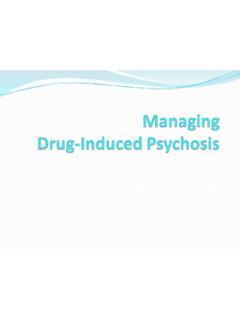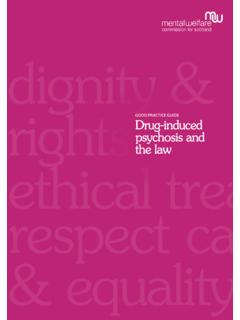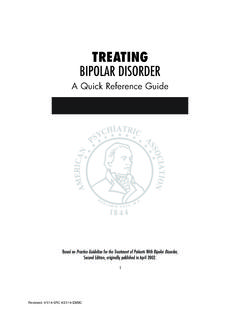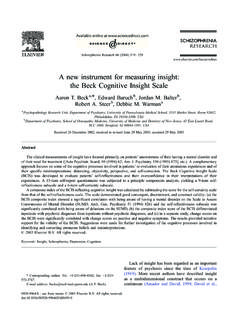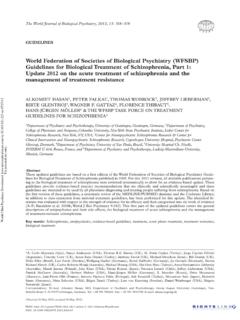Transcription of Long-acting injection antipsychotic medications in …
1 ReviewE-bPC - 27 Long-acting injection antipsychotic medications in the management of schizophreniaEmilio Sacchetti1,2, Heinz Grunze3, Stefan Leucht4, Antonio Vita 1,21 Department of Clinical and Experimental Sciences, University of Brescia; 2 Department of Mental Health, Spedali Civili, Brescia; 3 Institute of Neuroscience, Academic Psychiatry, University of Newcastle; 4 Department of Psychiatry and Psychotherapy, TU-M nchenCorrespondenceEmilio Psychiatric Care 2015;1;27-36 AbstractAntipsychotic drugs are recommended both for the treatment of the acute episodes and the prevention of recurrence of psychosis . long -term goals of treatment of schizophrenia include relapse prevention, recovery, improved adherence to therapy and improved patients quality of life. Antipsychotics in combination with other therapeutic interventions are considered essential for the achievement of these long -term goals.
2 However, relevant issues relating to the pharmacotherapy of schizophrenia still remain unresolved. Poor adherence to antipsychotic therapy is an important factor that contributes to possible inadequacy of treatment. A considerable ef-fort has been put into the development of antipsychotic drugs with better toler-ability, or in formulations that enable less frequent administration, including Long-acting injectable (LAI) antipsychotics. In recent years, the development of these formulations with atypical antipsychotics and the promising results obtained in well conducted trials with these compounds are changing the at-titudes towards these drugs, traditionally reserved to patients with long -term histories of non-adherence to treatment. The discovery and development of antipsychotic drugs more than 50 years ago has significantly improved the quality of life of patients with schizophrenia and currently there is little doubt about the substantial benefits of antipsychotics 1.
3 antipsychotic drugs are generally recom-mended for all stages of schizophrenia, for the treatment of acute epi-sodes of psychosis and for the prevention of recurrence 2. Important long -term goals of current treatment for schizophrenia include relapse prevention, recovery, improved adherence to therapy and improve pa-tients quality of life. Antipsychotics in combination with other therapeutic interventions are considered as essential for the achievement of these long -term goals. Several relevant issues relating to the pharmacotherapy of schizophre-nia especially when starting treatment and for how long to continue it still remain unresolved and often result in an inadequacy of treatment for many patients, such as its premature termination or delayed ac-cess to treatment 1. Poor adherence to antipsychotic therapy is another important factor that contributes to possible inadequacy of treatment 3.
4 A considerable effort has been put into the development of antipsy-chotic drugs with better tolerability in order to improve adherence, or in formulations that enable less frequent, and by this a more reliable administration, including Long-acting injectable (LAI) antipsychotics. In recent years the development of these formulations of atypical antip-sychotics and the promising results obtained in well conducted trials with these compounds are changing the attitude towards these drugs, E. Sacchetti et - E-bPCtraditionally reserved to patients with long -term his-tories of non-adherence to treatment importance of continuity of treatmentThe course of schizophrenia is characterized in about three quarters of the cases by phases of remission alternating with phases of relapse: after the first epi-sode, it is estimated that only 14-20% of patients will recover completely 2.
5 In addition, knowledge about the neurobiological basis of schizophrenia has pro-vided evidence of the often progressive nature of the disease 5. There is clear evidence indicating that the suspension of treatment is associated with a re-lapse in most cases 2. It is also increasingly evident that early intervention in psychosis may have posi-tive effects on the long -term course of illness, while a delayed access to mental health services in recent-onset schizophrenia seems to be associated with slower or incomplete recovery, an increased risk of recurrence and an overall poor outcome 6. Continu-ity of treatment already in the early stages seems crucial and may alter the outcome of the disease. A study published by Robinson et al. 7 clearly showed that despite a generally good response to initial treat-ment, patients with a first episode of schizophrenia had a cumulative recurrence rate greater than 80% within five years.
6 After the initial remission, discon-tinuation of antipsychotic medication was identified as a significant risk factor for recurrence, resulting in an almost five times increased risk. There is a multitude of relapse prevention studies in schizophrenia in general, but so far only a few con-trolled clinical trials have evaluated the possibility of preventing relapse in patients suffering specifically from a first episode of schizophrenia. In one of these studies 8, 131 first episode patients in remission for at least six months were randomized to discontinue treatment or continue it, for the most part with lower doses of atypical antipsychotics, and were followed for 18 months. Discontinuation was associated with a significantly higher recurrence rate (43% vs. 21%, p < ). A more recent randomized controlled trial (RCT) 9 compared continued maintenance therapy with intermittent treatment in patients with remitted first episode schizophrenia who received mainte-nance therapy for only one year.
7 Recurrence rates were significantly higher in the group receiving inter-mittent treatment than in the group that received con-tinuous maintenance treatment. In the light of these results, indicating the importance of continuous treat-ment from the early phases of the disease onwards, we might wonder whether a LAI antipsychotic should be used already after the first episode of schizophre-nia. In this regard, a recent observational community cohort study conducted in Finland 10 investigated the risk of rehospitalization and medication discontinua-tion in a nationwide cohort of 2,588 consecutive pa-tients with schizophrenia who were hospitalized for the first time between 2000 and 2007. The authors reported that the use of LAI antipsychotic (haloperi-dol, risperidone, perphenazine, zuclopenthixol) was associated with substantially better outcomes than with the equivalent oral formulations.
8 LAI atypical antipsychotics in early psychosisAs for LAI atypical antipsychotics, there are currently very few data available on their use in first - episode schizophrenia. An open-label study 11 conducted over two years in patients with first episode schizophrenia showed that those assigned to risperidone LAI had a significantly lower recurrence rate and a higher percentage of ad-herence compared to the control group treated with oral risperidone. In another open-label study 12 conducted on patients with newly diagnosed schizophrenia or schizophreni-form disorder, treatment for two years with risperi-done LAI led to a remission in 64% of patients. A RCT reported on the acceptance and the initial ad-herence outcomes with risperidone LAI treatment in patients with first episode schizophrenia 13. Individu-als who took risperidone LAI were significantly more likely to remain adherent at 12 weeks compared with patients treated with oral antipsychotics.
9 These re-sults support the feasibility and acceptability of LAI atypical antipsychotics as a treatment strategy al-ready at the early stages of of treatment One of the open questions about how best to ensure the continuity of the treatment is the question of how long to treat patients in the maintenance phase of schizophrenia 1. Based on evidence of clinical studies showing that even those patients who have been sta-ble on antipsychotics for the period of two to five years after an acute episode relapse more frequently if they are taken off medication than if they continue it 14. Ac-cording to the guidelines of the Canadian Psychiatric Association 15 antipsychotic drugs for the treatment of Long-acting injection antipsychotic medications in the management of schizophreniaE-bPC - 29a first episode of psychosis should be continued for at least two years after the first symptom remission, while one should observe a minimum of five years of stability without relapses before making a slow with-drawal of antipsychotic drugs over a 6-24 months in patients with a history of previous recurrences.
10 As in the treatment of other chronic diseases, a signif-icant problem with continued long -term antipsychotic treatment is that of undesirable effects of drugs. In addition to the well-known neurological side effects of typical antipsychotics, there is clear evidence of metabolic side effects associated with some atypical antipsychotics 16. Some studies have also suggested that chronic exposure to antipsychotics may contrib-ute to the reduction of the volume of brain tissue founf in the disease 17. However, one study 18 conducted in patients with newly diagnosed schizophrenia verified that prolonged treatment with Long-acting risperidone was associated with stability of white matter volume, in contrast to a volume reduction observed in pa-tients treated with the oral formulation of the same drug; the study concluded that changing the adher-ence to risperidone may act on myelination and give reason for the better prognosis associated with the LAI antipsychotic than the oral is clear, however, that the risk-benefit ratio of long -term treatment should be carefully considered and that the clinician should be careful in prescribing the lowest dose of antipsychotic needed to control symptoms.
